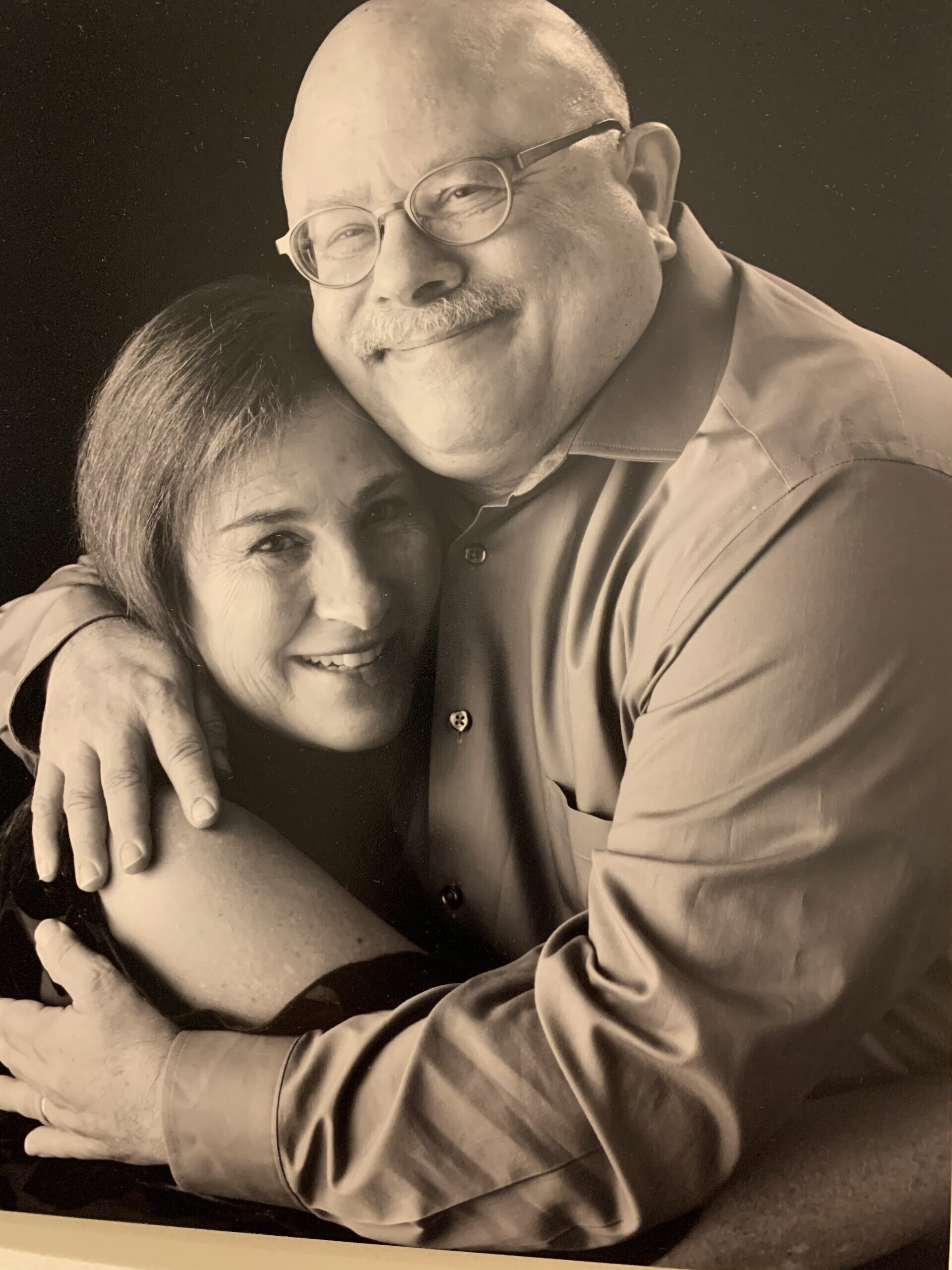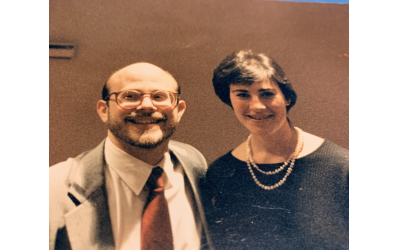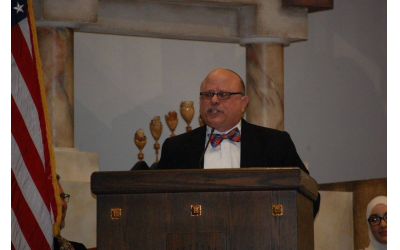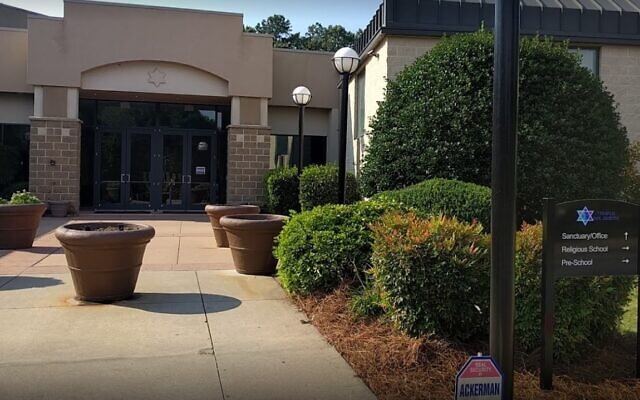Lebow Prepares to Pass Torch at Kol Emeth
Rabbi Steve Lebow is preparing to retire. His successor was announced Feb. 21, pending approval by the congregation.
Dave Schechter is a veteran journalist whose career includes writing and producing reports from Israel and elsewhere in the Middle East.
As a 5-year-old, Steve Lebow wore a clip-on tie when he attended services at Temple Emanu-El, the Reform synagogue in Ft. Lauderdale, Fla., where his father was congregation president.
The boy noticed that “Up on the stage there was a guy, and the guy tells a story. After the story is done, the guy sings a song. After the song is done, we all go in the next room and have a cookie.”
I can do that, he thought.
On a Sunday morning a couple of years later, Lebow entered the bedroom of Irving and Rita Lebow and asked how to spell “ambition” and, soon after, how to spell “congregation.”
Curious, Lebow’s parents found him using a crayon to write a letter of application to the Hebrew Union College, in Cincinnati, the training ground for Reform rabbis. Lebow still has the letter he received from HUC in 1963, informing its youngest-ever applicant that he first would have to graduate college. And after graduating from Kenyon College, in Gambier, Ohio, Lebow entered HUC.
He was ordained in 1983, then worked for three years as an assistant rabbi at a synagogue in New Orleans. Friends introduced him to Madeline Sable, who was teaching education at Tulane University; they were wed within a year and have been married for 35 years.

When a recruiter from the Central Conference of American Rabbis called in 1986 with an offer to be the first full-time rabbi at Temple Kol Emeth in Marietta, Lebow replied, “That sounds like a slam dunk idea. Where’s Marietta, Georgia?” Now Lebow – currently the longest-serving rabbi in Atlanta – is preparing to retire.
A couple of miles from Kol Emeth is the Conservative Congregation Etz Chaim, which became the first synagogue in Cobb County when it was founded in Marietta in 1975. Rabbi Shalom Lewis was the longest-serving until he assumed emeritus status last year. Kol Emeth, founded in 1982, was Cobb County’s first Reform congregation.
When Lebow arrived, it numbered fewer than 40 families. “I’ve been a bricks-and-mortar kind of rabbi. That was what was called for, because there was no Reform presence in Cobb County. I had to be a builder,” he said, over an early lunch at a restaurant near Buckhead.
Before building its home on Old Canton Road, Kol Emeth met at Mt. Zion United Methodist Church, at the former Atlanta Jewish Community Center at Shirley Blumenthal Park in Cobb County, and at The Catholic Church of the Transfiguration.

Kol Emeth grew quickly – perhaps too fast, Lebow acknowledges — reaching 800 families, though the number today is half that. “The reason I became a rabbi was to work with individuals, to help them find their own spirituality. When you are the rabbi of a very large congregation, much of what you do is corporate responsibilities of governance and fundraising,” his least favorite aspect of the job, he said.
“The rabbinate is the last profession for generalists. You have to be good with little children. You have to be good with older people. You have to be engaging with teenagers. You must be reachable to people who are married. You have to give good sermons. You have to give good classes. And there’s not a single rabbi that’s fantastic at everything,” Lebow said. He added, “The rabbi needs to be a capable fundraiser and able to oversee the synagogue’s physical plant and interact harmoniously with the staff.”
Lebow’s advice to those selecting his successor was, “It’s got to be a mensch. Pick a rabbi who can be there at difficult times. That’s the kind of rabbi people need.”
Lebow and the new rabbi, who will start July 1, will overlap for three months, during which time Lebow will impart what he can about Kol Emeth and then step back.
“A goal is to allow a new rabbi to successfully lead that pulpit, and in order to do that, I have to make myself scarce,” Lebow said. After a time, he plans to return to teach a class and, beginning in 2021, hopes to annually deliver the yizkor sermon at Yom Kippur.
In “retirement,” Lebow will exercise his rabbinic chops at three small congregations: Rodeph Sholom Congregation in Rome, Ga., the Jewish Congregation of Blue Ridge in the north Georgia mountains; and Shalom b’Harim, which meets in Gainesville, Ga. Lebow believes he may have been the first rabbi locally to conduct a same-sex marriage ceremony. He will continue to conduct weddings and funerals for unaffiliated Jews.
Other items on Lebow’s 16-point retirement to-do list include writing scholarly articles (he also holds a doctorate from HUC); continuing to publish mystery, horror and science fiction stories; helping homeless families through the group Family Promise; taking guitar lessons; and earning his red belt in Kempo karate.
Then there are the 30,000 comic books, along with action figures, and toys from the 1960s that occupy the first floor of his home near the Marietta Square. Such a comic devotee is Lebow that he writes analyses for Marvel comics fan sites.
Lebow will stay busy, which is good for Sable, a former psychotherapist, who is a Realtor with Berkshire Hathaway HomeServices.
They have two daughters: Shira-Rose Sable Lebow Andres, 31, who works in the software business in Washington, D.C., and Julia Rena Sable Lebow, 25, a film editor in Los Angeles, and songwriter and lead guitar of Guppy, an indie rock band receiving favorable reviews.
Madeline has been “my conscience,” Lebow said, encouraging his engagement on civic issues, even if they did not directly impact his congregants. “I sort of fell into it. I wasn’t planning on being a social activist,” he said.

Lebow marched in January 1987 to integrate Forsyth County and campaigned against a 1993 resolution passed by Cobb County commissioners that promoted “the traditional family structure” against “the lifestyles advocated by the gay community.”
Activism has its cost, including threats that, for a time, required bodyguards. In 2001, when the pastor of Mt. Bethel United Methodist Church banned Lebow from delivering the baccalaureate speech to the Walton High School graduating class, saying that a non-Christian preaching would “dishonor” Jesus Christ, the event was moved to the Cobb County Civic Center.
As for his most celebrated activism, “I had studied the case of Leo Frank, but I did not remember the lynching had occurred in Marietta, Georgia, until I arrived in Marietta,” Lebow said.
He has been a constant voice seeking exoneration for Frank, the Jewish manager of a downtown Atlanta pencil factory, whom Lebow and others believe was wrongly convicted in the 1913 death of 12-year-old factory worker Mary Phagan. Her family lived in Marietta. A cabal of Cobb County men, angry that Gov. John Slaton commuted Frank’s death sentence to life in prison, kidnapped him from the penitentiary in Milledgeville and lynched Frank in a Marietta woods near Frey’s Ginn Road before dawn on Aug. 17, 1915.
Lebow, who enjoys the irony of a rabbi living in Marietta, has led memorial services in Frank’s name, placed plaques near the lynching site, helped arrange for placement of a permanent memorial, and urged Fulton County authorities to re-examine Frank’s conviction.
A quarter-century ago, Kol Emeth gave Lebow a “life tenure” contract. Last year, he decided that it was time to step away.
“One of the lessons of the Torah is that success is always multi-generational. Nobody gets it right in their own lifetime. There’s always somebody who comes after you that builds on what you did,” Lebow said. “The Bible, in the book of Ecclesiastes, says, one generation comes and another generation goes.”




comments